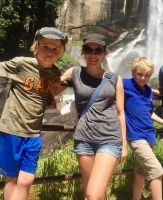We are proud to announce that Dr Rose Michael is the 2019 recipient of the Capstone Editing Carer’s Travel Grant for Academic Women. Dr Michael will be travelling with her mother and two children (one of whom has additional needs) to London in July of this year. While abroad, Dr Michael will present at Great Writing: The International Creative Writing Conference. There, she will give a critical presentation on Writing Through Climate Change and a creative presentation on Else, her novel-in-progress. Using this award, Dr Michael is able to cover her family’s flight expenses, which allows her mother to co-care for the children while she attends the conference and pursues an extended program of research in the UK.
Capstone Editing’s financial assistance not only assists Dr Michael in presenting her valuable work internationally, but also highlights the importance of travelling and collaborating to enhance personal networks and facilitate career progression. Ultimately, this grant gives Dr Michael the opportunity to bring her family with her and, in doing so, Dr Michael seizes an opportunity that is predominantly less available for primary carers.
Dr Michael is a lecturer in writing and publishing at RMIT with a history in creative writing, publishing and academia. She worked as a commissioning editor at Hardie Grant Books and co-founded and directed micro-press Arcade Publications. She has been editor of the national trade press journal The Weekly Book Newsletter and Books + Publishing magazine and has written independently about local independent publishing in Logos: Journal of the World Publishing Industry and with colleagues in the recent Book Publishing in Australia: A Living Legacy anthology.
Dr Michael has also had speculative fiction criticism published in The Conversation, Text, Sydney Review of Books, M/C Journal of Media and Communication and forthcoming in Foundation: The International Review of Science Fiction. Not only is she a critic, but also a writer—you can find Dr Michael’s most recent creative speculative fiction piece in Going Down Swinging #39. Her first speculative novel, The Asking Game, was a runner-up for the Vogel and received an Aurealis honourable mention. Short stories from The Asking Game appeared in Island, Griffith Review, Best Australian Stories and won a University of Melbourne prize. An early extract from Dr Michael’s second novel, The Art of Navigation, was shortlisted for a Conjure award.
For more information, you can view Dr Michael’s publications on academia.edu here.
The Capstone Editing Carer’s Travel Grant for Academic Women will enable Dr Michael to share with London audiences her critical research into speculative fiction and climate change. Dr Michael will discuss how, through speculative fiction, we can explore the consequences of our actions, the flexibility of our futures, and what influence our choices may have. Dr Michael’s thought-provoking presentation will ask whether science fiction and fantasy tropes might challenge Modernist narratives of progress, and non-realist tales pose existential speculations that help us imagine effects and their causes differently.
Dr Michael puts these concepts into practice in her current project, Else, which is the subject of her creative presentation at the conference. Else is Dr Michael’s third novel, which she places in the new and evolving ‘climate-fiction’ genre: it brings the environmental and cultural consequences of climate catastrophe to life through the literary depiction of the evolving relationship between an atypical mother and her neurodiverse daughter. Needless to say, Capstone Editing is extremely proud to assist Dr Michael in her extremely timely and relevant research.
Else Synopsis
Else, Dr Michael’s third novel, charts a mother’s growing realisation that her daughter is not ‘normal’. Speculative? Fiction? But the real story is our current climate catastrophe …
When Else’s school refusal gets too much, her mother gives up. Piling them in the car she heads down the coast, braving flash floods to seek sanctuary at the beach shack her father built, on the skinny wrist of peninsula that pincers Port Phillip Bay. But a superstorm cuts them off from the mainland.
Cyclonic flooding is followed by a bushfire inferno, driving the pair further down ‘The Ninch’, to the old Quarantine Station, where mother and daughter raid museum displays for supplies. They commune with the ghosts of generations past and await rescue … by 21st century chopper or the Tall Ships of White Settlement? Time, like progress, seems to move backwards.
Else is a literary ‘cli-fi’ that uses the relationship between mother and child to chart how the bonds between Man and Nature are stretched. And imagine what happens when the balance imperceptibly—and then radically—tips.


